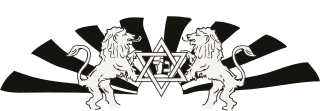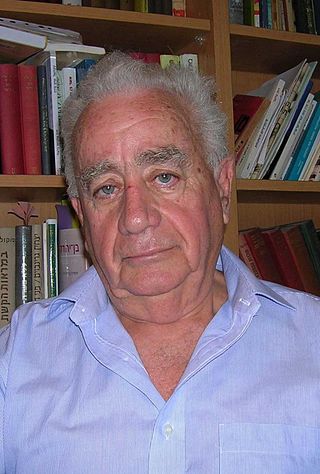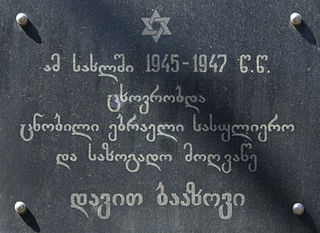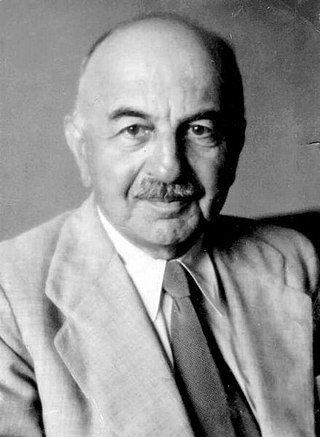Related Research Articles

Lehi, often known pejoratively as the Stern Gang, was a Zionist paramilitary militant organization founded by Avraham ("Yair") Stern in Mandatory Palestine. Its avowed aim was to evict the British authorities from Palestine by use of violence, allowing unrestricted immigration of Jews and the formation of a Jewish state. It was initially called the National Military Organization in Israel, upon being founded in August 1940, but was renamed Lehi one month later. The group referred to its members as terrorists and admitted to having carried out terrorist attacks.

Zionism is a nationalist movement that emerged in the 19th century to enable the establishment of a homeland for the Jewish people in Palestine, a region roughly corresponding to the Land of Israel in Jewish tradition. Following the establishment of the modern state of Israel, Zionism became an ideology that supports the development and protection of the State of Israel as a Jewish state.
Jews and Judaism in China are predominantly composed of Sephardi Jews and their descendants. Other Jewish ethnic divisions are also represented, including Ashkenazi Jews, Mizrahi Jews and a number of converts.

The Mizrachi is a religious Zionist organization founded in 1902 in Vilnius at a world conference of religious Zionists called by Rabbi Yitzchak Yaacov Reines. Bnei Akiva, which was founded in 1929, is the youth movement associated with Mizrachi. Both Mizrachi and the Bnei Akiva youth movement continued to function as international movements. Here the word "Mizrahi" is a notarikon for "Merkaz Ruhani" lit. Spiritual centre: מרכזרוחני, introduced by rabbi Samuel Mohilever.
Jehuda Reinharz served as President of Brandeis University from 1994–2010. He is currently the Richard Koret Professor of Modern Jewish History and Director of the Tauber Institute for the Study of European Jewry at Brandeis. He is also the president and CEO of the Jack, Joseph and Morton Mandel Foundation. On September 25, 2009, Reinharz announced his retirement as President of Brandeis, but at the request of the Board of Trustees, he stayed on until a replacement could be hired. On January 1, 2011, Reinharz became president and CEO of the Jack, Joseph, and Morton Mandel Foundation.
Shortly prior to and during World War II, and coinciding with the Second Sino-Japanese War, tens of thousands of Jewish refugees were resettled in the Japanese Empire. The onset of the European war by Nazi Germany involved the lethal mass persecutions and genocide of Jews, later known as the Holocaust, resulting in thousands of Jewish refugees fleeing east. Most ended up in Japanese-occupied China.

Samuel Mohilever, also Shmuel Mohilever, was a rabbi, pioneer of Religious Zionism and one of the founders of the Hovevei Zion movement.

Yosef Gorny, is Professor of Study of Zionism and head of the Zionist Research Institute at the Tel Aviv University. He is a former head of the Weizmann Institute for the Study of Zionism, at the same university.

David Baazov was a Georgian-Jewish public and religious figure who spearheaded the Zionist movement in Georgia. His program was an amalgam of moderate orthodox religiosity, enlightenment, and Zionism. He was born in Tskhinvali, South Ossetia, Georgia into a family of rabbis. He was educated in Jewish philosophy and history at Slutsk and Vilnius where he became exposed to Zionist ideas.
Simon Kaspé (1909–1933) was a Russian Jewish resident of Harbin, Manchuria who was kidnapped, ransomed, tortured, and murdered by a gang of fascist criminals under the influence of exiled White Russian leader Konstantin Rodzaevsky. The halfhearted investigation into his disappearance and death by the Japanese authorities, who were courting the White Russian community as local enforcers and fomenting their anticommunism, sparked anti-Japanese sentiment among the Jewish community of Manchukuo and the flight of nearly 70% of the Jews of Harbin.
Dr. Abraham Josevich Kaufman was a Russian-born medical doctor, community organizer and Zionist who helped protect some tens of thousands of Jews seeking safe-haven in East Asia from Nazi atrocities during World War II.
Revisionist Maximalism was a short-lived right-wing militant political ideology and Jewish militant ideology which was part of the Brit HaBirionim faction of the Zionist Revisionist Movement (ZRM) created by Abba Ahimeir.
Robert (Boris) Bitker was a military commander of the Zionist paramilitary group Irgun.

Yaacov Ben-Dov was an Israeli photographer and a pioneer of Jewish cinematography in Palestine.

The common definition of Zionism was principally the endorsement of the Jewish people to return to their homeland, secondarily the claim that due to a lack of self-determination, this territory must be re-established as a Jewish state. Zionism was produced by various philosophers representing different approaches concerning the objective and path that Zionism should follow.
Arie Leo Hanin was a Lithuanian-American political activist.

Anti-Jewish riots occurred on June 7–8, 1948, in the towns of Oujda and Jerada, in the French protectorate of Morocco in response to the 1948 Arab–Israeli War ensuing the declaration of the establishment of the State of Israel on May 14. The two towns—located near the border with Algeria—were departure points for Moroccan Jews seeking to migrate to Israel; at the time they were not permitted to do so from within Morocco. In the events, 47 Jews and one Frenchman were killed, many were injured, and property was damaged.

Israel Cohen was an Anglo-Jewish, Zionist leader, writer, and journalist, who served as secretary of the World Zionist Organization.

Arthur Menachem Hantke was a jurist, lawyer and economist, one of the leaders of Zionist movement in Germany and one of the leaders of the Zionist fundraising organization Keren Hayesod.
References
- ↑ Who's Who, Israel. P. Mamut. 1963. p. 409. Retrieved 16 March 2021.
- ↑ "JewishGen ShtetLinks. Harbin Memories from Yaacov Liberman". Jewishgen.org.
- ↑ Parker, Eleanor (July 1998). "China Judaic Studies Association. Book Reviews".